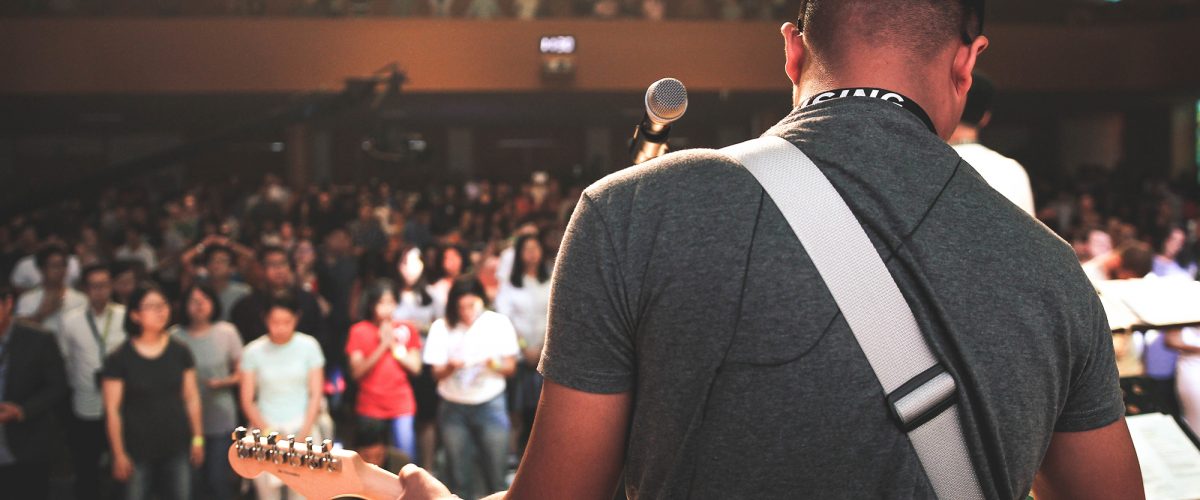Christianity Today recently published an opinion piece titled, “All About That Tenor: Why Men Don’t Sing in Worship.” The authors and their sources, one of whom is a treasured friend and a trusted colleague of mine, center their piece on the challenges men face singing much of today’s congregational music. It’s a fine piece — as far as it goes — but only scratches the surface of the self-induced, secular culture-driven decline in congregational singing.
I know I run the risk of this piece being read as an older-generational, “get off my lawn, kids” kind of piece. But, if you will, let me simply describe the many reasons congregational music has been in decline for at least 40 years.

Charlie Fuller
My descriptions are based on my nearly 30-year “first life” as a music professor preparing both music educators and church musicians to do exactly what we’re talking about here: help people — of all talent levels — to engage deeply in and actively participate in singing.
Those same 30 years were spent studying and teaching things like acoustics, voice development and training, musical ability, musical aptitude, and the ways music engages the brain. And my research, training and experience strongly indicate there are multiple factors that have sent all congregational music into decline in many churches.
“There are multiple factors that have sent all congregational music into decline in many churches.”
The decline in congregational singing isn’t limited to men. Congregational singing is in decline among all genders and all age groups. The challenges that lower-voiced men face singing melodies pitched too high for them are also a problem for women who have low voices. And if we pitch melodies in lower keys, we’re simply making the songs too low for both men and women who have high voices.
Christianity Today seems to be parroting the conservative trope about the decline of masculinity across the evangelical landscape. Why else such a concern about only masculine singing? I would suggest they read Kristin Kobes Du Mez’s book, Jesus and John Wayne or Beth Allison Barr’s The Making of Biblical Womanhood to see the damage toxic masculinity has wrought throughout evangelical Christendom.
When we look seriously and closely at the decline of actual participation in congregational singing, there are a host of factors at play. Let me illustrate a few.
First, worship itself has become more entertainment than actual participatory worship. Blame it on the media. Blame it on the influence of business models that turn churches into purveyors of religious goods and services. Blame it on celebrity-based worship and church life. Blame it on whatever you wish. But the truth is that worship has evolved into a performance-based experience that is passive for most people in the pews. They come to “see a show.” They don’t come to be engaged and many, if not most, worship planners have succumbed to that expectation.
“We’ve lost the ability to distinguish between a concert and a worship experience.”
We’ve lost the ability to distinguish between a concert and a worship experience. They simply are not the same. Both are good, but each has different expectations for those who come. A concert is a passive experience. Worshipers, in contrast, should expect to be actively engaged.
And worship planners should always have that in mind.
Second, 40 years ago or so, our worship music choices began to come from Christian radio. That trend has only accelerated. But Christian music was designed for experienced, often professional singers to perform.
Would you expect to be able to go to the nearest baseball stadium and hit major- or minor-league pitching? A few of us might manage a foul ball or two, but most of us would swing and miss badly.
Singing songs written for a concert stage is no different. Their ranges are often too wide and their rhythms often too difficult. Music written to impress in a concert situation is not music written for the average person in a pew to sing.
But we have music specifically written for people with limited backgrounds to sing. You can find it in hymnals. Is that the only place? No. There is also much folk-based music that developed in response to the urge of everyday people to sing.
Third, many churches worship in spaces that defeat any intent for congregational participation. Many churches now have been designed for electronic sound systems and not for natural sound. These spaces have padding everywhere to absorb the high sound pressure levels generated by sound systems. As a result, the singers in the pews can’t hear the people around them. In many churches, they can’t even hear themselves due to the blast of the sound system.
“If you can’t hear the people around you singing and you can’t hear yourself sing, why bother?”
If you can’t hear the people around you singing and you can’t hear yourself sing, why bother?
Fourth, another detriment to singing in our churches is the decline of graded choir programs. Graded choir programs were specifically designed to train people in the pews to sing. Their objective was to prepare people for a lifetime of singing in worship. As these programs have declined, so has our congregational singing.
Finally, if you look at the heritage of singing in our churches, you’ll find most hymns are written in parts. Our forebears understood well there are a multitude of voices — high and low, men and women, young and old — who gather to worship. The four-part offering of traditional hymns is a natural response to the diversity we find in our pews. Is that melody too high? Sing the bass line. Or sing the alto line. Is that section too low? Sing the tenor line.
Continuing as a theologian as well as a church musician, I believe there also has been a tragic decline in our collective theological depth since the advent of commercial music in the 1970s and ’80s. Because of our learning about brain function, we know people gain and retain much more theological content from the singing they do than from the sermons they hear. And what people are hearing and sometimes retaining is a thin, commercial veneer of Christian theology.
Yet, we are where we are. Some of us saw it coming decades ago. We’re called as ministers and churches to engage the culture and the people who are a part of that culture. It’s a challenge, and we must admit that, when it comes to music, we’re working with one hand tied behind our back.
But let’s not pretend the challenge is only for men. It’s for all of us who want to hear the body of Christ sing again with a full-throated voice to God.
Charlie Fuller earned a doctor of ministry degree from Baptist Theological Seminary at Richmond and a master of divinity degree from Baylor University’s Truett Seminary — after previously earning three music degrees. He previously served as dean of fine arts at Ouachita Baptist University, where he was named professor emeritus of music. He also has been minister for congregational life at Second Baptist Church of Little Rock, and executive pastor at First Baptist Church of the City of Washington, D.C. He also is former director of the CenturyMen choir. He and his wife, Cindy, now live in Waco, Texas, where they are members of Lake Shore Baptist Church. He currently serves as interim minister of music at Wilshire Baptist Church in Dallas along with his work as an executive coach, working with executives in churches and other organizations.


